Great Barrier Reef Marine Integration Workshop
 The Great Barrier Reef Marine Park Authority (GBRMPA), the Reef Water Quality Partnership, and IAN coordinated the Marine Integration Workshop in Townsville, Australia, to consider how the components of the Marine Monitoring Program can be better integrated to facilitate the assessment of marine ecosystem health in relation to water quality characteristics, and ultimately, to relate this to watershed indicators. A reporting framework for the integration of data collected under the Marine Monitoring Program was established. The workshop, which ran September 10-12, was attended by Bill Dennison and Jane Thomas from IAN, and Ben Longstaff from EcoCheck.
The Great Barrier Reef Marine Park Authority (GBRMPA), the Reef Water Quality Partnership, and IAN coordinated the Marine Integration Workshop in Townsville, Australia, to consider how the components of the Marine Monitoring Program can be better integrated to facilitate the assessment of marine ecosystem health in relation to water quality characteristics, and ultimately, to relate this to watershed indicators. A reporting framework for the integration of data collected under the Marine Monitoring Program was established. The workshop, which ran September 10-12, was attended by Bill Dennison and Jane Thomas from IAN, and Ben Longstaff from EcoCheck.
Protecting the Great Barrier Reef through improved land management
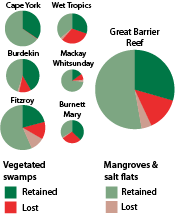 On July 21 and 22, IAN and EcoCheck participated in a workshop in Brisbane, Australia, to advance the goals of the Queensland Department of the Premier and Cabinet's (DPC's) "Paddock to Reef Program". The goal of the meeting was to discuss assessment and integration options for catchment, pollutant loading, and marine ecosystem data from the Great Barrier Reef. The program aims to prevent degradation of reef ecosystem health by reducing key pollutant loads through improved land management activities. IAN and EcoCheck have been working with DPC since May 2010 to integrate data and develop communication products for technical and summary reports for the Great Barrier Reef and six sub-regions.
On July 21 and 22, IAN and EcoCheck participated in a workshop in Brisbane, Australia, to advance the goals of the Queensland Department of the Premier and Cabinet's (DPC's) "Paddock to Reef Program". The goal of the meeting was to discuss assessment and integration options for catchment, pollutant loading, and marine ecosystem data from the Great Barrier Reef. The program aims to prevent degradation of reef ecosystem health by reducing key pollutant loads through improved land management activities. IAN and EcoCheck have been working with DPC since May 2010 to integrate data and develop communication products for technical and summary reports for the Great Barrier Reef and six sub-regions.
Great Barrier Reef Report Card
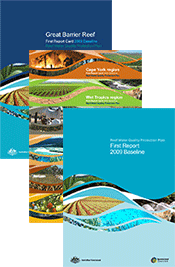 The Great Barrier Reef is the largest and best-known coral reef ecosystem in the world. This first report card provides an estimate of the status of the key indicators for the period preceding 2009. It is based on historical data and trends and takes into account the influence of a variable climate from year to year. This serves as a baseline that will be used as a point of comparison to measure progress towards Reef Plan goals and targets. This report card (and the accompanying regional summaries and technical report documents) presents results up to 2009 and therefore does not include the effects of Cyclone Yasi and the more recent flood events which will be presented in subsequent reports. For additional details on the GBR report card, see the Reef Plan Report Card website.
The Great Barrier Reef is the largest and best-known coral reef ecosystem in the world. This first report card provides an estimate of the status of the key indicators for the period preceding 2009. It is based on historical data and trends and takes into account the influence of a variable climate from year to year. This serves as a baseline that will be used as a point of comparison to measure progress towards Reef Plan goals and targets. This report card (and the accompanying regional summaries and technical report documents) presents results up to 2009 and therefore does not include the effects of Cyclone Yasi and the more recent flood events which will be presented in subsequent reports. For additional details on the GBR report card, see the Reef Plan Report Card website.
UMCES researchers attend biennial Coastal and Estuarine Research Federation Conference
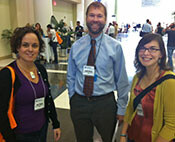 IAN and UMCES researchers attended the biennial Coastal and Estuarine Research Federation's conference in Daytona Beach, Florida in early November 2011. This international conference brings together all the diverse disciplines within coastal and estuarine science, such as geochemistry, physical oceanography, biological systems, management, and education. Several IAN researchers presented on their integrated assessments of Baltimore Harbor, National Park Service parks, and the Great Barrier Reef, as well as attended plenary and poster sessions.
IAN and UMCES researchers attended the biennial Coastal and Estuarine Research Federation's conference in Daytona Beach, Florida in early November 2011. This international conference brings together all the diverse disciplines within coastal and estuarine science, such as geochemistry, physical oceanography, biological systems, management, and education. Several IAN researchers presented on their integrated assessments of Baltimore Harbor, National Park Service parks, and the Great Barrier Reef, as well as attended plenary and poster sessions.
Assessing the vulnerability of the Great Barrier Reef to climate change
 Bill Dennison, Heath Kelsey, and Jane Thomas recently attended a Great Barrier Reef Foundation workshop to develop a synthetic publication that charts the vision for assessing the vulnerability to climate change. There are major climate impacts already being manifested, including sea surface temperature-induced coral bleaching, coral skeletal degradation due to ocean acidification, and relative sea level rise leading to inundation of mangroves. The development of a climate vulnerability index would provide a probability-based assessment of the likelihood of damage due to climate. This index is designed to complement the Great Barrier Reef report card.
Bill Dennison, Heath Kelsey, and Jane Thomas recently attended a Great Barrier Reef Foundation workshop to develop a synthetic publication that charts the vision for assessing the vulnerability to climate change. There are major climate impacts already being manifested, including sea surface temperature-induced coral bleaching, coral skeletal degradation due to ocean acidification, and relative sea level rise leading to inundation of mangroves. The development of a climate vulnerability index would provide a probability-based assessment of the likelihood of damage due to climate. This index is designed to complement the Great Barrier Reef report card.
Great Barrier Reef report card released in Australia
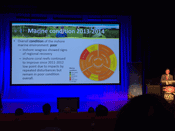 The Great Barrier Reef Report Card 2014 was officially released during the 18th Annual Riversymposium in Brisbane, Australia on September 21 and attended by Bill Dennison, Heath Kelsey, and Jane Thomas. The Hon. Dr Steven Miles, Queensland Minister for Environment and Heritage Protection and Minister for National Parks and the Great Barrier Reef, launched the Report Card during the opening plenary session of the conference.
The Great Barrier Reef Report Card 2014 was officially released during the 18th Annual Riversymposium in Brisbane, Australia on September 21 and attended by Bill Dennison, Heath Kelsey, and Jane Thomas. The Hon. Dr Steven Miles, Queensland Minister for Environment and Heritage Protection and Minister for National Parks and the Great Barrier Reef, launched the Report Card during the opening plenary session of the conference.
The Office of the Great Barrier Reef institutional assessment was published
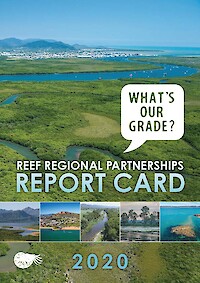
Bill Dennison and Simon Costanzo conducted an institutional assessment for the Office of the Great Barrier Reef. In this assessment, five goals were established: cohesive staff, credible science, resilient organization, relevance to stakeholders, and effective outreach. Each goal had its own set of indicators. Scores were generated for the Wet Tropics Waterways, Dry Tropics Partnership for Healthy Waters, Healthy Rivers to Reef Partnership, Fitzroy Partnership for River Health, and Gladstone Healthy Harbour Partnership, as well as an overall report card for the partnership as a whole.